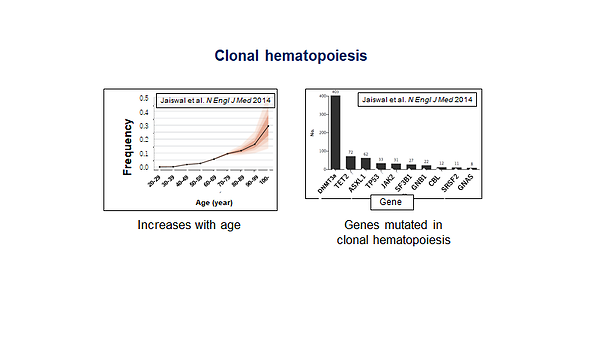Healthy people with “clonal hematopoiesis” tend to develop a variety of adult diseases including leukemia, strokes and acute myocardial infarction

Date
Location
Description
Dear All,
Cell Signal Unit (Yamamoto Unit) would like to inform you of a seminar by Dr. Toshio Kitamura from The Institute of Medical Science, University of Tokyo.
-----------------------------------------------------------
Date: Wednesday, February 13, 2019
Time: 13:00-14:00
Venue: C015, Level C, Lab 1
-----------------------------------------------------------
Speaker:
Dr. Toshio Kitamura, The Institute of Medical Science, University of Tokyo
Title:
Healthy people with “clonal hematopoiesis” tend to develop a variety of adult diseases including leukemia, strokes and acute myocardial infarction
Abstract:
Recent progress in sequencing technologies has identified a variety of novel gene mutations in patients with malignancies as well as genetic diseases. Interestingly, leukemia-associated mutations are also identified in blood cells of healthy elderly people; one (or two in rare cases) mutation is identified in about 10% of healthy population older than 65. The mutations include epigenetic factors, such as DNMT3a, TET2 and ASXL1. This situation is now called “clonal hematopoiesis” or CHIP, clonal hematopoiesis of indeterminate potential. One percent of people with clonal hematopoiesis develop hematological malignancies every year, showing a 10-times greater risk compared with the age-matched population without clonal hematopoiesis. Intriguingly, people with clonal hematopoiesis also tend to develop adult diseases including strokes, myocardial infarction and diabetes mellitus. In addition, one fourth of patients with solid tumors after chemotherapy are found to have clonal hematopoiesis. Moreover, cancer patients with clonal hematopoiesis easily recur and have shorter overall survival.
To study clonal hematopoiesis, we have recently establish a mouse model for clonal hematopoiesis (ASXL1-MT-KI mouse) in which a mutant ASXL1 is expressed from the Rosa26 locus in blood cells. These mice do not develop hematological malignancies despite of mild anemia. However, these mice are in pre-leukemic states associated with activation of mitochondria, increased amount of reactive oxygen species and increased DNA damages. In addition, we now have some preliminary results that these mice develop atherosclerosis with shorter latencies when crossed with LDL receptor-knockout mice and fed with Western diet. In addition, melanoma cells proliferate more quickly in mice with “clonal hematopoiesis” compared with normal mice. Thus, our ASXL1-MT-KI mouse is a useful model for clonal hematopoiesis.
Host:
Prof. Tadashi Yamamoto
We hope to see many of you at the seminar.
Best regards,
Yuki Nakagawa
Research Unit Administrator
Cell Signal Unit
Subscribe to the OIST Calendar: Right-click to download, then open in your calendar application.



